BULLETIN 128 - July 2003
Congo Free State “ENREGISTRE” Mail
First,
shown below is the postal decree of the service’s
creation, from André De Cock’s book “Le Congo Belge et
ses marques postales” page 72/73 (Editor’s note: pages
71-72 in 1986 2nd edition)
Instructions
according to the decree of January 25th, 1898
Creation
of “enregistered ” service
“According
to the current information from our postal service, the
deposit of an ordinary letter at the post office and its’
travel to its’ destination isn’t verified by any
document. In case of loss or delay, any investigation under
these conditions is often unfruitful.”
“After some requests, the Government researched
what should be done to assure more security at the mailing
and receipt of letters, however without generalising the
registration service, which the Administration couldn’t in
the current circumstances, to assure the responsibility in
the Upper-Congo.”
“It is for this purpose that the decree of the
State Secretary, on January 25th 1898, establishes the
“Enregistré” Service. This name has been chosen to
avoid confusion of this service with the registration
service, which is completely separate.”
The following instructions have been given to assure
the achievement of this decree: “ with a supplementary
postage fee of 15c. per mailing, the sender of a letter
could ask, where there is no registration service, that he
be given a written acknowledgement of receipt for his
deposit and that his item be specially indicated on the
dispatch sheet with which it will be included.”
This part of the decree’s article I will be
immediately executed in all sub post offices, except in
Banana, Boma and Matadi (1) where such “enregistré” has
no reason to be setup, because the registration service
exists.
The cost of an “enregistré” letter for interior mailing is 15c. postage + 15c.(“enregistré”) fee for a total of 30c.
« enregistré »
is an interior service but can however be applied to items
to foreign countries, to the moment where they arrive in the
international postal service : they can receive an
acknowledgement of mailing at the starting post office and
be indicated on the dispatch sheet which accompanies
the dispatches from the sending post office to the exchange
post office (Boma or Banana).
Such an “enregistré” item is and remains an
ordinary piece of mail during its’ travel in international
postal service unless it has been registered at one of the
post offices authorized to receive mail of this type.
Thus, the sender can, at an interior sub post office “enregistré” an item to foreign countries ; franked 50c. (ordinary rate for foreign countries) + 15c. (fee for “enregistré”). When this item arrives in the Lower Congo, it should be registered by the sender’s agent (mandatary)(2) for a normal fee of 50c. If the sender doesn’t have an agent (mandatary) in the Lower Congo or if the agent isn’t advised of the letter’s transit to be registered, the interior post office has agreed to accept , if the postage paid equals 1.15 fr(3), corresponding item in “enregistré” state, to be registred at Boma; in this case, they will inscribe on the sheet of dispatch sheet the note : “ to be registered at Boma post office, postage paid” + the sender’s name.
The administration assumes no responsibility in case
of loss or delay in the transmission of “enregistré”
items, it has judged useless to make registers reporting the
delivery of those items to the addressee and has limited the
establishment of special registers for deposits, numbered
from 1 to 500 ; the receipt detached from those registers
will be the sender’s receipt.
It doesn’t appear necessary for the most part to
modify the text of theadvice
sheets used in the interior relationship between post
offices ; it will suffice that the postman cancel with large
marks the word “recommandé” which is found at front of
those sheets and replace it with the word “ enregisté”.
Labels for applying the word “enregistré” on
letters submitted for this service, will be sent in a short
time to all sub post office, at the same time as the special
registers in question.
The “enregistré” number will be handwritten by
the postman, next to the “enregistré” marking.
The above instructions will be given notice at all
concerned post agents.
The Governor General,
F. FUCHS
(2)(3)
see below, comments and updates
of the decree
On March 15th, 1900 Léopoldville became a principal
post office (in the past, a sub-post office) and thus the
first registration post office met by the interior mails.
All known covers (with one exception) are dated in
the 20th century and thus have been registered at
Léopoldville ; only one is known dated
in the 19th century and has been
registered at Boma in 1899.
Summary of all possible cases and number of known items :
Postage rate |
Description
|
Number
known |
|
1,40
F |
international
letter(50 c) + registration (50 c) + « enregistré »
(15 c) + acknowledgment
of receipt (25 c) |
1 |
|
1,15
F |
international
letter(50 c) + registration (50 c) + « enregistré »
(15 c) private
post card (PPC) before may 1902
(50 c) + registrations (50 c) + “enregistré”
(15 c) |
3 5 |
|
80
c |
postal stationery (15 c) + registration
(50 c) + “enregistré” (15 c) |
1 |
|
45
c |
Printed
matter + “ enregistré” domestic
usage |
1 |
|
30
c |
international
postal card (15 c) + “enregistré” (15 c) international
PPC after May 1st 1902 + “enregistré” (15 c) |
1 1 |
|
Free
postage rate |
Official
domestic letter (free
postage rate) + “enregistré” |
1 |
No
Mols stamps were issued to pay this postage rate (1.15 fr)
with only one stamp ; this “enregistré” service was
temporary, created only for a small demand.
Popocabacca sub-post office July 15, 1899
Ibembo sub-post office January 2 , 1900
Ibembo sub-post office September 1900
Ibembo sub-post office April 30, 1902
Basoko sub-post office September 24, 1902 (*)
Basoko sub-post office September 30 ,1902 (*)
Tumba-mani sub-post office March 7, 1903
Pweto auxiliairy post office May 3, 1903
Basongo sub-post office May 14, 1903
Basoko sub-post office March 26 ,1904
Uvira sub-post office March, 1907
(*)
same sender
Postal
stationery with markings of all cancels available at post office, CTO at the back :
Nyangwe
sub-post office
19** (no year)
Chute François-Joseph
sub-post office
1905
The
letters which must be registered at Leopoldville for
international destination, are generally (3) franked with
sufficient postage which was applied by the sender and
sometimes with the notation “to be registered at
Leopoldville”. We have never seen any addition of stamps
to pay for registration, by a mandatory agent at Boma or
later at Leopoldville.(2)
However, some mailers have sent their letters only
“enregistré”, without registration ; whether on account
of forgetfulness or for protecting their letters only during
their transportation in the Congo. We can thus see the
mention, hand-written at Leopoldville : “postage rate
insufficient for registration” No postal form, including
dispatch sheets, acknowledgments of receipt (registration)
or acknowledgment of “enregistration” has yet been seen
with “enregistré” marking.
The Fuch’s postal decree gives us the starting date of the “enregistré” service, but no decree gives the end. Only the registration service’s penetration into the Upper Congo establishes those limits. The search for the first known dates of registration in the Upper Congo could set the limits of the use of “enregistration”, on a post office by post office basis. However, it would seem that in Middle Belgian Congo, the registration service was completed around 1905 and in 1907 for the Upper Congo. By 1909, the post offices of Belgian Congo no longer had an “enregistation” service.
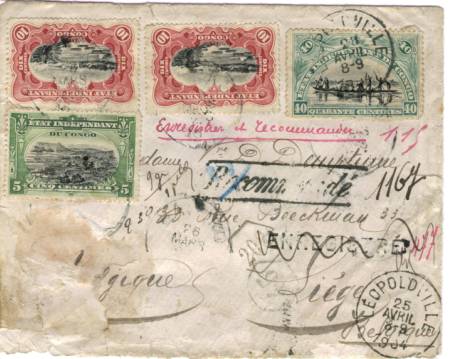
Cover
sent from Basoko March 26th, 1904 to Liege, Belgium where it
arrived on May 23rd. “Enregistré” number 477 and
franked with the complete postage rate (a 50c. Mols is
missing.) at Basoko. All stamps were
cancelled at
Basoko. Bumba transit April 1st
and arrival on April 25th at
Leopoldville where the “enregistré” mark is cancelled
with pen and the registration number 1167 was applied. The
postman cancelled a second time the 40c. which had received
a poor (insufficient) cancel at Basoko. The
registered cover continued its’ journey and finally
arrived at Brussels and Liège on May 23rd.

Shown on the previous page is a letter sent from Ibembo to Brussels where it arrived on November 20th, 1900. "Enregistré" number 4, franked with the exact postage rate with remark "to be "enregistered" and registered". All stamps cancelled at Ibembo. When it arrived at Leopoldville on October 28th, the "enregistré" mark was cancelled with pen and registration number 4141 was applied. Transit Boma at October 31th, 1900. Note the break on the left of the Léopoldville "recommandé" marking, which during 1901 will lose its' small oblique bars . (Part of left bar already lost). Exact franking of 1.15fr with 1fr lilac (registered international letter) and 15c. ochre (enregistré). The sender marked in red around the stamps in order to prevent any theft by the carrier before that the stamps were cancelled at the post office.
Registered cover, not “enregistered”.
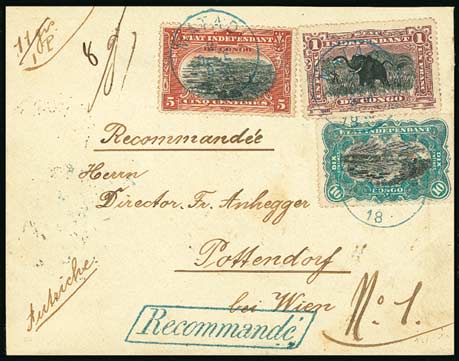
Letter
sent from Manyanga and stamped by the sender at 1.15fr, as
postage rate of an “enregistered” letter to be
registered. However, the first post office reached by the
letter, Matadi on December 8th, 1898, was a principal post
office which could register a letter for international
destination :. The letter was thus not “enregistered”.
The indicated weight of 11gr was weighed a second time as
8gr, both weights being a single weight. At Matadi the
registration number 1 was added and all stamps were
cancelled.
This
is an interesting cover because the sender living in the
Upper Congo didn’t known if his letter would first reach a
sub post office or a principal post office. Thus the sender
franked the letter with the rate for inland
“enregistration” and “registration” for
international use.
Now
when we send a registered letter, we go to the post office
and we pay the correct postage rate directly calculated by
the postman. In the past, in the Upper Congo, the sender put
his stamps on the letter and gave it to a carrier (a
boy/native) to take it to the post office at a distance of
many kilometres. If the applied postage was incorrect, the
letter continued its’ journey with postage due or without
registration if underpaid , or with a mention “stamped by
the sender” if the sender put too much postage on the
cover. This mention doesn’t always mean a philatelic item.
The above cover does not have the correct postage, as only
1fr was necessary for a registered cover, but the sender
thought his letter must be “enregistered” and thus put
on 1.15fr. It’s not a philatelic item but rather an
historic item which can be explained according to this
special decree of “enregistration” – particulary not
easy to apply by the senders and sometimes by even by the
post office itself.
PPC « enregistered » and registered – 1,15 Fr
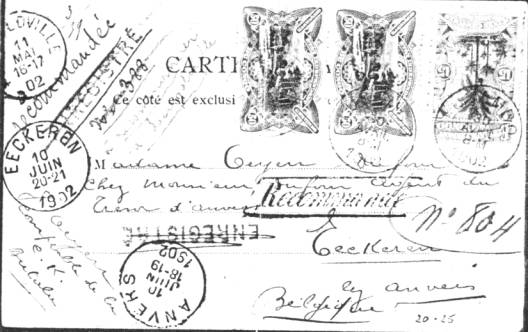
PPC
sent from Ibembo April 30th, 1902 with Anvers transit to
Eeckeren-lez-Anvvers where it arrived on June 10th.
“Enregistré” number 388, with remark “to be
registered at Leopoldville” It’s the last day of the
50c. postage rate for PPC. On May 1st, 1902
the rate became 15c. It arrived at Leopoldville on
May 11, where the “enregistré” was cancelled with pen
and registration number 804 was applied.
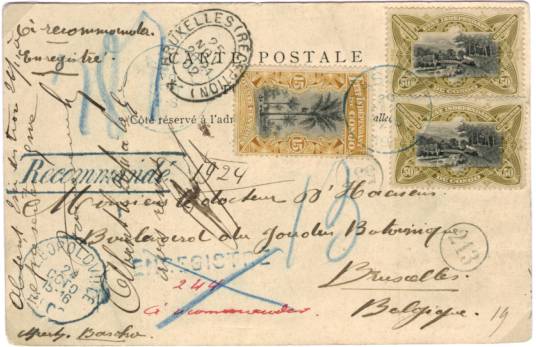
PPC sent from Basoko September 30th, 1902 to Brussels where it arrived on November 25th . “Enregistré” number 244, with remark ”to be registered”. It arrived at Leopoldville on October 24th , where the “enregistré” was cancelled with pen and registration number 1924 was allied. (postage rate see note X ).
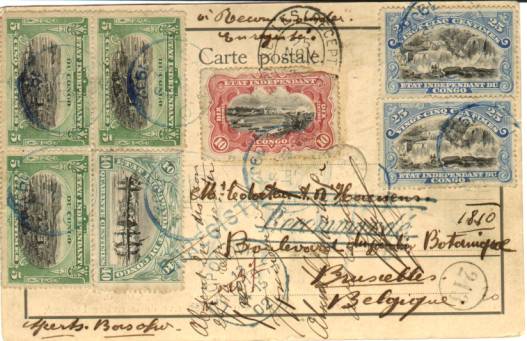
PPC sent from Basoko September 24th, 1902 to Brussels where it arrived on November 24th. “Enregistré” number 237, with remark ”to be registered”. It arrived at Leopoldville on October 13th, where the “enregistré” was cancelled with pen and registration number 1810 was applied. (postage rate see note X).
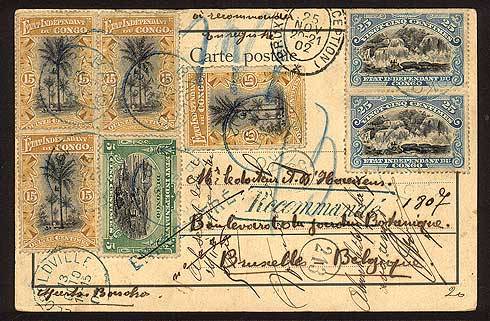
PPC sent from Basoko September 24th, 1902 to Brussels where it arrived on November 25th. “Enregistré” number 239, with remark ”to be registered”. It arrived at Leopoldville on October 13th , where the “enregistré” was cancelled with pen and registration number 1807 was applied. (postage rate see note X))
Note
X:
The
above three picture post cards (PPC) came from the same
sender. The correct postage rate after May 1st,
1902 was: PPC (15c.) +
enregistré (15c) + registration (50c.) =
80c., but these cards were franked 1.15fr based on the 50c.
PPC rate prior to May 1st, 1902. The sender ignored the new
rate and continued to mail at the past rate. Curiously there
was no remark “stamped by sender” for excessive postage
(always put on registered cover when the postage is
overpaid) applied at Leopoldville when the cover was
registered.
Letter « enregistered », registered & AR– 1,40 Fr
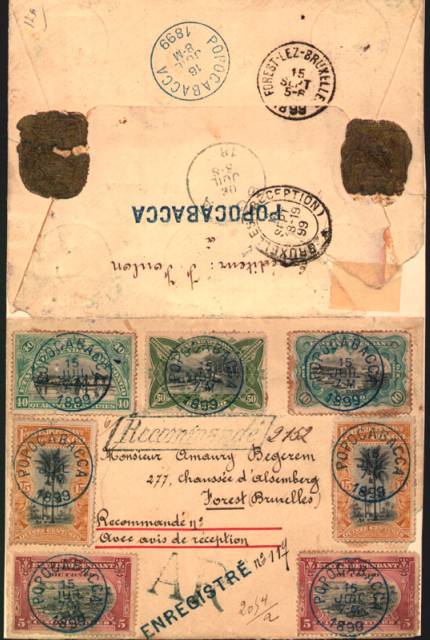
Letter (ex Du Four collection) from Popocabacca mailed on July 15th, 1899 to Brussels where it arrived on September 15th.“Enregistré” number 117 ; arrival at Boma on July 30th, registration number 2152 and “AR” (receipt requested). The only known nieteenth century “enregistré” item .
Postage rate 1.40 fr :
Letter simple weight : 50 c
ENREGISTRE : 15 c
Registration : 50 c
acknowledgment of receipt : 25 c
Business letter (quadruple weight rate) "enregistered" & registered
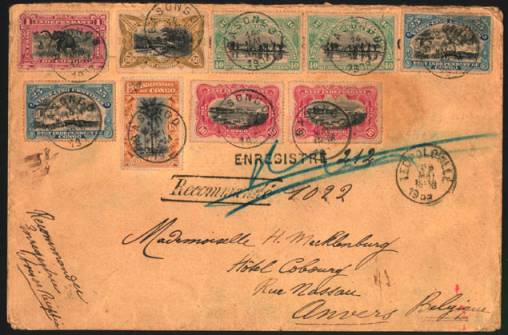
Business
letter mailed from Basongo on May 14th, 1903 to Anvers where
it arrived in June 1903.
“Enregistré” number 212. Arrival
at Léopoldville on May 22nd , where “ENREGISTRE” was
cancelled with pencil and
registration number 1022 was applied. The letter
actually weighed 58 grams, thus was a quadruple weight rate.
The sender probably weighed the letter at
approximately 60 grams and applied postage for
5 weights, thus 3.15 F in postage instead of the
needed 2.65 F.
Postage
rate :
Letter 4 weights :
2,00 F. (4 x 50 c)
ENREGISTRE :
15
c
Registration :
50 c, thus 2.65 fr
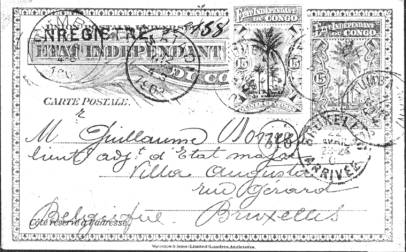
On
the previous page,a postal card mailed from Tumbu-Mani on
March 7th, 1903 to Brussels where it arrived on April 2nd.
Transit at Tumba March 10th and Matadi March 12th.
“Enregistré” number 158. No registration was requested.
“Enregistré” wasn’t cancelled because the
stationery couldn’t be registered. It continued on its’
journey to Belgium as regular mail, for it was only
protected by “enregistré” within the Upper Congo.
PPC “enregistered” at 30c. (without registration)
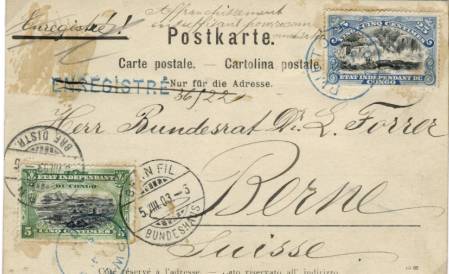
PPC
from Pweto May 3rd, 1903 to Berne/Switzerland where it
arrived on August 5th.
“Enregistré” number 36/22 with no registration
requested. The “Enregistré” mark was cancelled in
error, because the PPC couldn’t be registered. The
handwritten remark “insufficiently stamped for
registration” was probably applied at Léopoldville. In
international mail it continued its’ journey as regular
mail, for it was only protected by “enregistré” within
the Upper Congo
Domestic printed matter "enregistered"- 45 c.
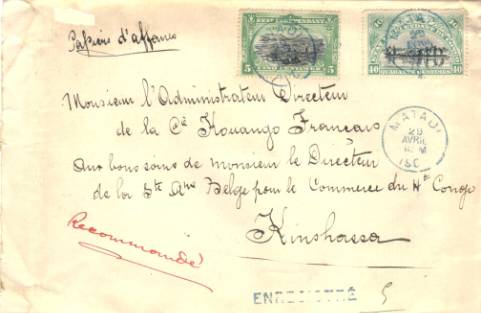
Shown on the previous page is a letter from Matadi on April 29th, 1900 to Kinshasa. "Enregistré" number 5 with no registration. 45c' postage paid by sender. This is curious because Leopoldville became a principal post office on March 15th and thus the registration could be applied to Léopoldville at this time. Red hand written "registered" by the sender, but the Matadi's postman applied only the "enregistré". Perhaps the registration service to Léopoldville wasn't yet in use.
Postage rate :
Printed matter: 5c. per 50gr - 4x5c/200gr. Domestic registration: 25c. Total: 45c.
Editors note:
Mr. Lindekens did the initial translation of his fine article from the original French to English. The editor has tried to further improve upon this translation. If this further translation introduced any errors the editor wishes to beg the author's and the readers' forgiveness.